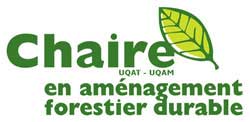Projet de recherche : Établissement de liens entre les changements climatiques anticipés et la classification écologique d’une portion de la forêt boréale et tempérée de l’Ouest du Québec.
Aurélie Chalumeau, Yves Bergeron, Mathieu Bouchard, Pierre Grondin, Marie-Claude Lambert, Catherine Périé. (2024). Anticipated impacts in habitat of diagnostic species of potential natural vegetations due to climate change at the ecotone between temperate and boreal forests Climate Change Ecology. 100089. 10.1016/j.ecochg.2024.100089 lien

